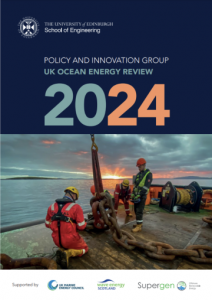Return to previous listing…
The Coverage and Innovation Group at the College of Edinburgh, alongside the Supergen ORE Hub, Wave Power Scotland, and the Marine Power Council, has released the 2024 UK Ocean Power Review.
The document emphasizes a year of significant advancement for the ocean energy industry, with its prospective role in our future decarbonised energy framework becoming increasingly apparent.
The combination of various targeted policy initiatives, from the enlarged tidal stream CfD ringfence fund to ongoing innovation support for the wave energy field, has highlighted the capacity of these technologies to significantly assist in achieving the 2030 clean energy objectives, and beyond. Furthermore, the report reinforces sector development over the previous year by providing updates on the progress made by the UK’s world-leading technology developers, its state-of-the-art R&D projects, and its globally recognized testing facilities.
The report was compiled by Kristofer Grattan, Donald R. Noble, and Henry Jeffrey from the Coverage and Innovation Group at the College of Edinburgh, with contributions from organizations such as the Division for Energy Security and Net Zero, Scottish Government, Welsh Government, Supergen ORE Hub, Wave Power Scotland, Marine Power Council, and the European Marine Energy Centre (EMEC).
Michael Shanks MP, Minister for Energy provided the introductory remarks for the 2024 report, praising the sector’s progress and acknowledging the increasing role that ocean power technologies can play in a future UK energy system:
“This government is dedicated to transforming Britain into a clean energy superpower. With 130 MW of tidal stream set to be deployed in UK waters by 2029, it is evident that tidal stream will take on a growing role in the 2030 energy mix, but with even greater potential regarding long-term decarbonisation goals.
“I am [also] pleased to observe the advancements made by the wave energy sector over the past few years, particularly in research and innovation. While the sector is still developing, it undoubtedly possesses the promise to make a significant impact on our future energy mix.
“I would like to express my gratitude to the various stakeholders who have aided the remarkable progress made by wave and tidal stream over the last 12 months.”
The advancements achieved by the sector throughout 2024 are further emphasized by Professor Henry Jeffrey, Head of the Coverage and Innovation Group at the University of Edinburgh and one of the report’s authors, who stated:
“As our report indicates, 2024 has been a year of substantial progress within the UK ocean energy sector. I’m thrilled to witness that the pipeline of tidal stream projects awarded through the CfD scheme has now grown to over 120 MW, ensuring that the sector makes a significant contribution towards the UK’s 2030 clean energy targets. Similarly, the advancements made by the wave energy sector should not be overlooked, with recent analysis revealing the potential to generate over 15,000 jobs across both sectors by 2050, enabling UK ocean energy to significantly exceed expectations when it comes to contributing to national Just Transition commitments.
“Of course, it must be recognized that for the sector to achieve these outcomes within the desired timelines, we must move away from a business-as-usual approach and ensure that essential policy support is delivered promptly and consistently.”
This report serves as an extension of the UK chapter of the International Energy Agency Ocean Energy Systems (IEA-OES) Annual Report, authored by the Coverage and Innovation Group in collaboration with the Department of Energy Security and Net Zero.
The report is available for download here: UK Ocean Energy Review 2024

